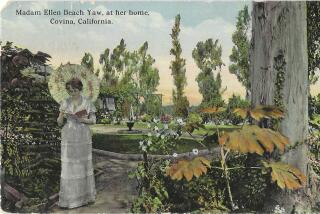Etta Moten Barnett, 102; ‘Porgy and Bess’ Star Sang at the White House
- Share via
Etta Moten Barnett, who starred in the 1942 production of “Porgy and Bess” on Broadway and broke color barriers in two 1930s films, has died. She was 102.
Barnett died Friday of pancreatic cancer at Mercy Hospital in Chicago, her family announced.
“Before Halle Berry and Dorothy Dandridge and even Lena Horne, there was Etta Moten, a black actress defying all the odds as an African American woman and performer,” Joy Bennett Kinnon wrote in Ebony Magazine.
Horne, who had met the singer several times, called her a “role model.”
“My father was in love with her,” Horne said in an interview last year, “and my grandfather took me to see her in ‘Porgy and Bess.’ I met her later when she was working in the Cotton Club.
“She was absolutely beautiful and a wonderful singer, and she did good work -- she was struggling for justice in the best sort of way,” Horne said.
Barnett, the daughter of a Methodist minister in Texas, was not a likely candidate for a career in stage and films. She married young, bore three children and left her marriage -- all before she was 30.
After her divorce, she returned to school, earning a bachelor’s degree in voice and drama and a teacher’s credential from the University of Kansas, where she was one of only 150 African Americans among a student body of 6,000.
Her senior recital in 1931, which was attended by 1,000 people, resulted in an invitation to perform solo for the highly respected Eva Jessye Choir in New York City. Leaving her children in the care of her parents, she headed for New York, stopping in Chicago.
It was there she met Claude Barnett, founder of the Associated Negro Press, a wire service for the nation’s black newspapers. Barnett, a protege of Booker T. Washington, had a wide circle of friends who could help the young singer in New York. He also fell in love with Moten, and they married in 1934.
Armed with letters of introduction, the singer auditioned for a Broadway play and got a part in “Fast and Furious,” which ran only for a few performances. Then she secured a role in “Zombie,” which went on the road. Eventually, she made her way to the West Coast.
In Hollywood, Barnett dubbed voices for Barbara Stanwyck, Ginger Rogers and other actresses in several films, and appeared in two films.
Both roles were small -- in “Flying Down to Rio,” she was listed simply as Etta Moten: The Black Singer. In “Rio,” she was among several who sang “The Carioca,” a production number showcasing the newly matched Fred Astaire and Rogers. “Say, have you seen a Carioca?” Barnett sang, a wide smile on her face. “It has a meter that is tricky/ A bit of wicked wacky-wicky.” The song, which Barnett performed with a basket of fruit piled in her hair, was nominated for an Academy Award.
Barnett’s role in the other film, “Gold Diggers of 1933,” was a breakthrough for an African American actress, even though Barnett was not in the credits.
In it, Barnett sings a chorus of “Remember the Forgotten Man,” a lament about World War I: “Remember my forgotten man/ You put a rifle in his hand/ You sent him far away/ You shouted, ‘Hip, hooray!’/ But look at him today!”
Like the white actresses who also sing portions of this song, Barnett is posed glamorously in a window of a tenement house -- a character far from the maids or mammies that black actresses had been allowed to play up to that time.
“Here was a black woman who wasn’t playing a servant, who wasn’t fat, middle-aged or maternal in appearance, who was, indeed, sexy and glamorous and who sang a torch song rather than a Negro spiritual,” the Chicago Tribune noted in a 1989 story about Barnett.
Barnett caught the attention of First Lady Eleanor Roosevelt, who asked her to sing “Forgotten Man” for President Franklin D. Roosevelt’s birthday party in 1934. Barnett was the first black woman to sing in the White House.
Barnett returned to New York to star in the 1942 revival of “Porgy and Bess.”
George Gershwin had wanted Barnett for the original production of “Porgy and Bess” in 1935.
“He told me I was Bess, that I had the verve and the looks he wanted,” she once said of Gershwin. But the composer also wanted Bess to be a soprano.
“I asked him to transpose it to my range, but he refused,” Barnett recalled years later. “He said Bess was ‘a good bad girl,’ which meant she had to be a soprano. I told him a contralto can be good and bad, too.” But Gershwin hired soprano Ann Brown as Bess.
After Gershwin died, “Porgy and Bess” was shortened for the return to Broadway production and Barnett finally got the role. She played for six months on Broadway before taking it on the road for two years.
But the strain of singing as a soprano damaged her voice. “I sang it too long,” she told Ebony magazine in 1997.
After her husband’s death in 1967, Barnett remained active in many organizations, including the National Council of Negro Women, the Chicago Lyric Opera, the Field Museum in Chicago, the DuSable Museum of African American History, the National Conference of Christians and Jews and the African American Institute.
At Barnett’s 100th birthday party in Chicago, Harry Belafonte was among her well-wishers. “She gave black people an opportunity to look at themselves on a big screen as something beautiful when all that was there before spoke to our degradation,” Belafonte said. “In her we found another dimension to being black in our time. She is a true shining star.”
Barnett is survived by her daughter, Sue Ish, of Chicago, and several grandchildren and great-grandchildren.
Funeral services were pending.
More to Read
The biggest entertainment stories
Get our big stories about Hollywood, film, television, music, arts, culture and more right in your inbox as soon as they publish.
You may occasionally receive promotional content from the Los Angeles Times.










